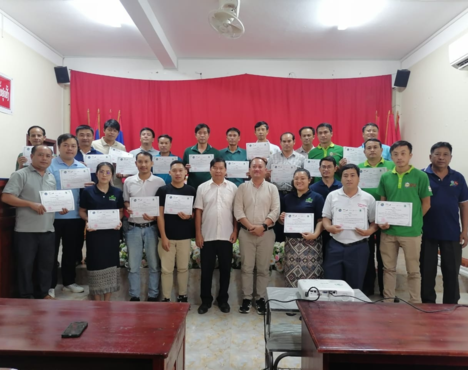Addressing Forest Degradation in Northern Laos: A Path to Sustainable Restoration

Imagine a landscape once teeming with diverse flora and fauna, now turned into large fields of single crops and grazing lands. Over the years, northern Laos has seen its forests degrade due to expanding agriculture, unsustainable farming, and pastures taking over unused land. This has caused serious problems like loss of wildlife, soil erosion, and disrupted water supplies, affecting local communities, which depend on the forest. They are seeking long-term solutions through better management of forest landscapes.
To address this challenge, two GIZ implemented projects, the Protection and Sustainable Use of Forest Ecosystems and Biodiversity in Laos (ProFEB) and Climate Protection through Avoided Deforestation (CliPAD) cooperate to address the forest degradation issues in the North of Lao PDR. The training sessions were conducted in Houaphanh, Sayaboury, and Luang Prabang, focusing on:
- Introduction to Forest Landscape Restoration principles and concepts
- Ecological assessment and restoration planning
- Tree species selection for Forest Landscape Restoration and diversity for restoration tool
- Selection of appropriate restoration techniques (e.g., assisted natural regeneration, enrichment planting, silviculture, soil and water conservation)
- Community participation and stakeholder engagement in Forest Landscape Restoration
- Monitoring and evaluation of restoration success
- Case studies of successful Forest Landscape Restoration projects in the region
This training programme is designed to equip participants with the essential knowledge, skills, and resources to effectively plan, implement, and monitor Forest Landscape Restoration initiatives. By empowering stakeholders, it aims to tackle forest degradation, promote environmental health, and improve local livelihoods, ultimately fostering a sustainable future for the region.
Participants learned hands-on techniques like natural regeneration and silviculture while discussing how to involve communities and work with different stakeholders. Led by experts from the National Agriculture and Forestry Research Institute (NAFRI), the programme offers a mix of presentations, practical exercises, field visits, and group discussions. This approach not only builds skills but also encourages collaboration, paving the way for sustainable forest management in Laos. as a result, the training will contribute to the development of partnerships between government, companies and villagers for forest biodiversity conservation and enhanced ecological connectivity at landscape level.
Additionally, there will be workshops to discuss restoration policies and future restoration partnerships between village communities, government agencies, CSOs and the private sector for. These workshops will help shape Laos’s strategy for restoring landscapes by sharing current research, consulting on national policies, and exploring new partnerships.
About the Project
The Protection and Sustainable Use of Forest Ecosystems and Biodiversity (ProFEB) project is a collaboration between the Lao Government, Germany and the European Union, led by the Ministry of Agriculture and Forestry. ProFEB also partners with the Ministry of Information, Culture and Tourism, the Ministry of Natural Resources and Environment, and the National University of Laos. The project is implemented in the provinces of Khammouane, Luang Prabang, Odomxay, Houaphanh, Sayaboury, Vientiane Province, and Vientiane Capital. The project is co-funded by the German Federal Ministry for Economic Cooperation and Development (BMZ) and the European Union and implemented by Deutsche Gesellschaft für Internationale Zusammenarbeit (GIZ) GmbH.
In 2024, CliPAD joined a collaboration with the GIZ project ProFEB, which received co-financing from the European Union to implement the Component 2 (Forestry) of the ‘Team Europe Partnership with the Lao PDR to increase sustainable and inclusive trade, investment and connectivity in the agriculture and forestry sectors (TICAF)’. ProFEB supports increased participation of local communities, particularly women, in strengthened forest-based value chains for sustainable use and conservation of forests. Output 4 on Forest Landscape Restoration (FLR) is implemented by CliPAD, based on the long-term engagement with over 500 villages in six northern provinces and the support of sustainable deforestation-free forest management practices. The output seeks to strengthen partnerships among private sector, villagers, government and civil society organizations for climate-resilient restoration of forest landscapes and biodiversity conservation.